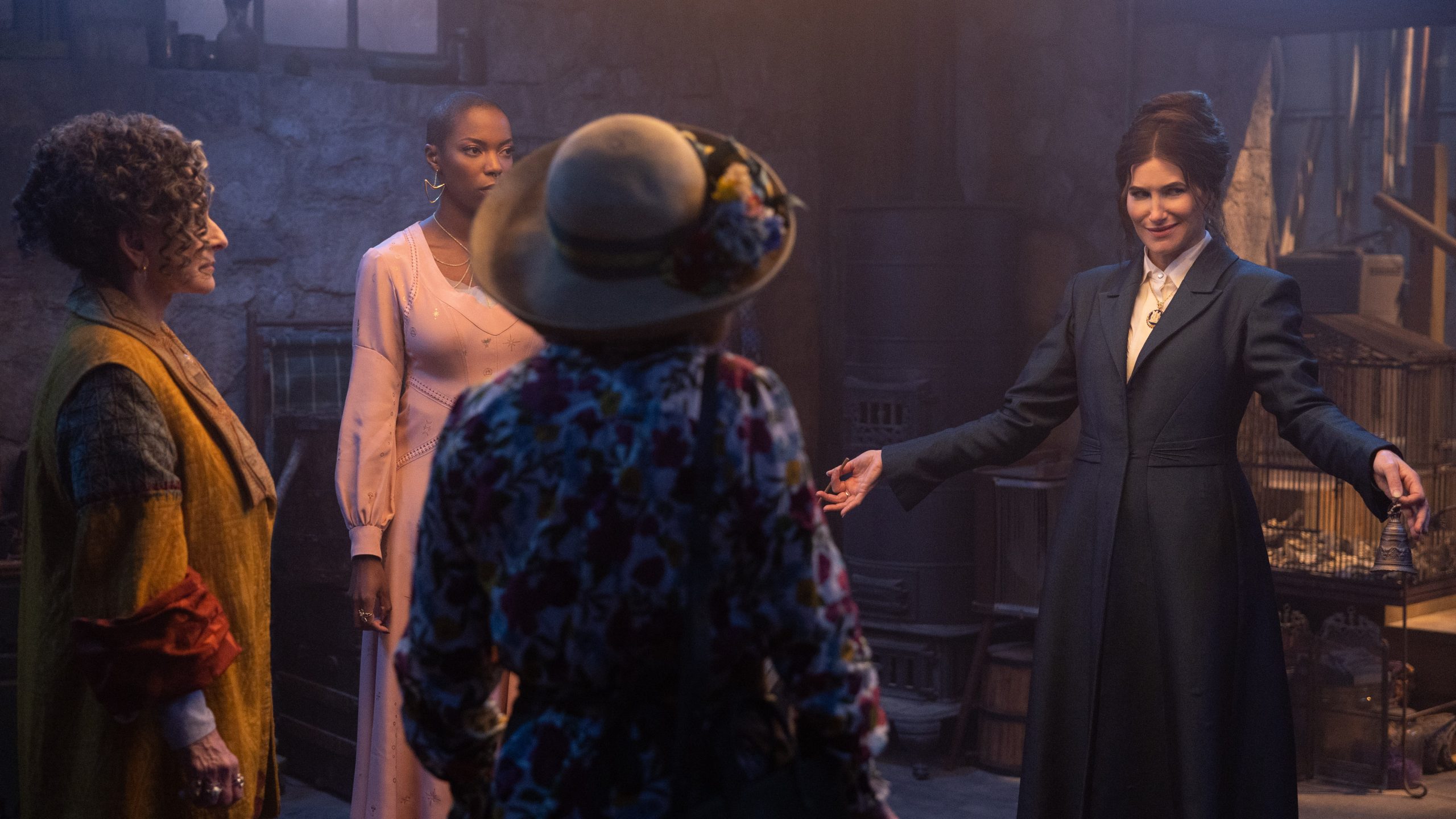Ten minutes into the premiere episode of the wonderful new Marvel series Agatha All Along, you might worry that you pressed play on the wrong Kathryn Hahn show. Instead of the powerful witch Agatha Harkness, whom Wanda “Scarlet Witch” Maximoff defeated in the finale of WandaVision, her character is Agnes, a mouthy, flannel-sporting, rule-breaking police detective investigating a murder in a prototypical small town. Her condescending foil? An FBI agent sent to keep her in line, played by Aubrey Plaza. It’s giving Mare of Easttown. But what’s really unsettling is the broadness of the performances by Hahn and Plaza, two of the best TV actors of our time.
[time-brightcove not-tgx=”true”]
Those weirdly stiff portrayals are our first clue that Agatha—a WandaVision spin-off from that series’ showrunner, Jac Schaefer, whose first two episodes are now streaming on Disney+—is having a bit of fun with us. Hahn is hamming it up Mare-style because Wanda (Elizabeth Olsen) seized Agatha’s powers and sealed her in the same suburban nightmare that had sent the Scarlet Witch hurtling through 20th century family-sitcom clichés for much of the series that bears her name. Who knows how many Strong Female Leads Agatha has been shoehorned into in the three years she’s spent trapped in the TV-trope hellscape that is Westview, New Jersey? Happily, we never find out; Agatha is no WandaVision retread, and its detour into detective-drama hackery is just the first of its many delightful, hyper-culturally-literate surprises.
The show’s true form, at least in the four episodes provided to critics, is that of the hero’s journey, albeit one undertaken by a protagonist we know as a villain. Rescued from her state of televisual enchantment by a mysterious teenage superfan, played by Heartstopper star Joe Locke, with black fingernails and a “boyf” whose phone calls he ignores, the imperious Agatha resolves to get her powers back by embarking on a storied path known as the Witches’ Road. Some say this supernatural superhighway is a myth; others believe it’s a fast lane to death. But legend has it that a witch who survives its gauntlet of trials will be rewarded with whatever she lacks—and Agatha isn’t about to resign herself to a life as Westview’s resident nosy neighbor.
To have even a ghost of a chance at finding the Road, let alone making it to the end and claiming her prize, this disgraced witch must overcome her noxious reputation among her own kind and put together a coven with the occult skills to help her pass its tests. It’s that core group of desperate misfits—and the beloved actors who play them—that makes the show so fun. When Agatha approaches Lilia (musical theater icon Patti LuPone), she’s slumming it as a storefront psychic with a chip on her shoulder about how Agatha feeds negative witch stereotypes. Jennifer Kale (SNL alum Sasheer Zamata) is a Goop-coded wellness entrepreneur whose snake oils have gotten her into legal trouble. Found doing security for a mall Hot Topic, Alice (The Diplomat’s Ali Ahn) happens to be Wiccan royalty, as the daughter of a Stevie-Nicks-like rock star who, decades earlier, recorded a hit rendition of a standard sung to conjure the Road, then vanished.
With Locke and Plaza (whose sexually charged dynamic with Hahn is pure Killing Eve) rounding out the cast, Agatha seems made to attract the female and queer fans who don’t always feel at home in the Marvel Cinematic Universe. The production design dazzles. The camp quotient is high. Savvy sendups of female-focused media abound, from Mare to the gleaming kitchens and cashmere tunics of Nancy Meyers. There’s some engagement with the hazards of dark feminine archetypes, but it’s irreverent more than sanctimonious in a trauma-plot or empowerment-porn way. And the overall vibe echoes the witchy, gothy comforts of female-dominated ‘90s cult classics: The Craft, Practical Magic, Hocus Pocus, Charmed, Buffy. Queer ur-text The Wizard of Oz, another road-trip saga, casts a yellow-brick shadow as well. Is this pandering? Maybe. But it’s so enjoyably executed—and so smartly timed to split the difference between autumn coziness and Halloween-season spookiness—that, as a member of the possibly-pandered-to demographic, I was too entertained to be offended.
Which is not to say that the show is out of the proverbial deep, dark woods yet. If Marvel struggles to retain viewers from outside traditionally superhero-friendly cohorts, it’s in part because the studio so often does wrong by the characters it creates to represent them. Some of its recent efforts, like Chloé Zhao’s Eternals and The Marvels, from Nia DaCosta (who ably revived Candyman), have squandered talented female filmmakers on bad ideas. Others, from the Captain Marvel feature to the Ms. Marvel series, started out with fresh-sounding premises, only to devolve into the same boring action spectacles Marvel always makes. Disney+ in particular seems to be having trouble setting aside rigid franchise conventions to make genre-transcending Marvel shows on the level of the Netflix psychological thriller Jessica Jones or the first season of FX’s psychedelic Legion. Of everything it’s tried, WandaVision came closest to breaking the mold. Then it ended with not just Agatha and Wanda shooting fireballs at each other against a digital crimson sky, but also the revelation that the destruction we’d just witnessed was the result of a woman’s uncontrollable emotions. What a disappointment.
So maybe you can see why it worries me when Marvel Studios streaming boss Brad Winderbaum says that Agatha “lures you in with the fun of Halloween, and before you know it, you’re crying.” I don’t need to weep over a witty witch show, and it would be frustrating to learn that that’s what the Marvel brain trust thinks women and queer people need out of entertainment. Still: four episodes in, Agatha is pretty faultless. Let’s pray to the Maiden, the Mother, the Crone, and, of course Our Lady of Easttown, that it stays that way.

